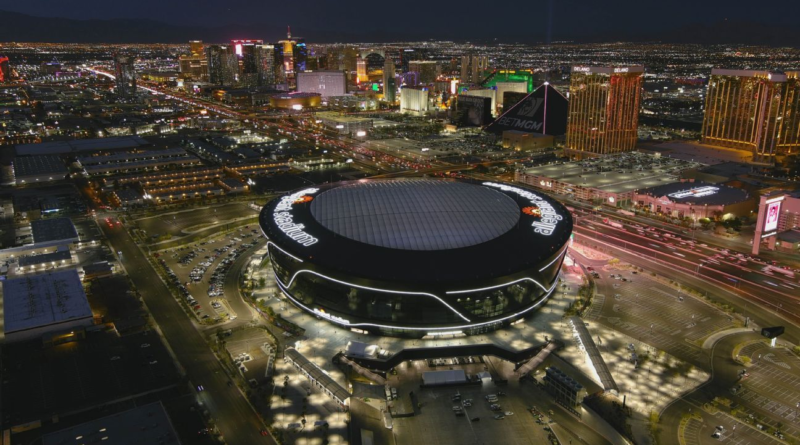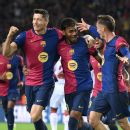The NCAA loves Las Vegas, but that wasn't always the case
LAS VEGAS — About one court length, or a snap-of-the-wrist Larry Johnson outlet pass, from the entrance to UNLV’s Thomas & Mack Center rests a 2,000-pound bronze statue of the Runnin’ Rebels’ late Hall of Fame coach, Jerry Tarkanian.
A solitary figure, the 6-foot-high sculpture sits on a stool with its right hand adorning a 1990 national championship ring. The statue is stuffing the trademark towel in its mouth as its weary eyes stare off into the distance. The superstitious Tarkanian’s “ghost” chair remains open to his right.
Given Tark the Shark’s legendary battles with the NCAA during a UNLV tenure from 1973 to 1992 that included a record of 509-105, four Final Four appearances and a national title, you can imagine the likeness standing up at night and turning around and facing the Las Vegas Strip, with the towel in place and scratching its forehead in disbelief at the scene taking place in the city.
The history is complicated, to say the least. After years of run-ins, the NCAA and Las Vegas have done a 180. The NCAA now embraces Sin City and has established a residency of its own in the glow of the Strip’s neon lights.
Five conferences — the Pac-12, Mountain West, WCC, Big West and WAC — now hold their respective tournaments in Sin City. The NCAA West Regional final, which boasts No. 2 seed and longtime Tarkanian nemesis UCLA, gets underway this week. The NIT championship moved here from New York City and the big one, the Final Four, will be co-hosted by, yep, UNLV at Allegiant Stadium in 2028.
Madness. March Madness.
Perception changed
Las Vegas of 2023 is a far different city from the Las Vegas of the 1990s, the height of the colossus Tarkanian built at the corner of Tropicana Boulevard and Maryland Parkway. In just one generation, Sin City’s image has transformed from a lawless, wild, wild west with Tarkanian’s band of Rebels running roughshod as the only sports show in town — where tickets on Gucci Row were harder to come by than a Frank Sinatra show. Tarkanian liked to say it was Disneyland for adults.
The general acceptance of sports betting, the decline of UNLV as a national power and the arrival of major league sports in the NHL’s Golden Knights, the WNBA’s Aces, the NFL’s Raiders and the global popularity of Las Vegas-based UFC have made the gambling capital palatable to the NCAA, Las Vegas insiders agree.
“The city has changed.”
“The city,” a longtime UNLV official said, “has changed.”
And while the stigma may be gone and more than three decades have passed since Tarkanian’s ouster, there’s bad blood and the scab remains. (The NCAA declined to comment for this article.)
“It’s a farce,” Anderson Hunt, the shooting guard and Final Four most outstanding player on UNLV’s 1990 national title team, told ESPN of the NCAA now embracing Las Vegas.
NCAA investigations into the program and university alleged dozens of violations. The most significant sanctions imposed initially banned UNLV from defending its title, which cost the program top recruits Ed O’Bannon and Shon Tarver, though the NCAA relented and UNLV was then banned from live television in the 1991-92 season and the 1992 NCAA tournament. UNLV was later banned from appearing in televised nonconference road games during the 1993-94 and 1994-95 seasons and from scheduling nonconference home games in Las Vegas during the 1994-95 season.
“Coach Tark is either rolling over in his grave or he’s laughing, saying, ‘I told y’all,'” Hunt said. “He’s up in heaven like, ‘Man …’
“The hypocrisy. They are one of the biggest organizations in the country, making money off the blood, sweat and tears of the players. Pimps. Hustlers. I’m not an NCAA fan, but I got two Final Four rings out of them.”
Hunt was walking the concourse of Las Vegas’ T-Mobile Arena — which will play host to Arkansas, Connecticut, Gonzaga and UCLA for the West regional — during the recent Pac-12 title game between UCLA and Arizona when Tucson fans recognized him and booed. They remembered his last-second 3-point shot to knock their top-ranked Wildcats out of the 1989 tournament in a Sweet 16 game.
“Some wanted pictures,” he chuckled.
Hunt laughed louder, though, as he recounted the blizzard of NCAA-mandated suspensions the Rebels incurred in their championship season, when all but two players on the roster — power forward Larry Johnson, who would go on to win the Wooden Award as college basketball’s top player and become the No. 1 pick of the 1991 draft, and backup guard Dave Rice, who would serve as UNLV’s coach from 2011 to ’16 — missed at least one game for such infractions as unpaid hotel incidentals or long-distance phone calls.
“I think,” Rice said, “that was because we were the only new guys on the team that year.”
“Nitpicking,” said Hunt, who was inducted into UNLV’s Hall of Fame last summer. “They was on our head so much, they make all this money on the players, and we couldn’t even sell T-shirts. We were kids. Worried about basketball and grades. They came and pulled Stacey [Augmon] off the plane before we took off for LSU.”
“I got a call in the hotel at 7 a.m.,” Hunt said. “I couldn’t play at Temple. Hotel incidentals. Phone. I don’t remember. But I was mad as hell. I wanted to play at the Spectrum [in Philadelphia]. That was one of the arenas I always wanted to play at. It was frustrating to us because the NCAA gave a bad perception of us. They had been trying to get Coach Tark since he was at Long Beach, and they couldn’t get him. It frustrated them, so they came after us.”
Hunt, who said the players’ attorney joked that the NCAA maintained a year-round apartment that served as an office a block from campus, and Rebels teammates Johnson, Augmon and Greg Anthony were long gone from UNLV — along with Tarkanian, who was forced to resign after the 1991-92 season — when Rice was hired to coach his alma mater by then-athletic director Jim Livengood in 2011.
“It was a great collaboration between casino leaders and people in the sporting world to change the public perception.”
Dave Rice, former UNLV player and former Runnin’ Rebels coach
Rice said he saw the perception of Las Vegas starting to shift when he was still in school, thanks in part to the Rebels being a “household name” nationally, and credited Livengood two decades later with showing the potential of his adopted hometown.
“It was a great collaboration between casino leaders and people in the sporting world to change the public perception,” said Rice, who led UNLV to its most recent NCAA tournament appearance, in 2013. “It was a win-win for everyone.
“Now, people see that Las Vegas is a family destination, a great place to raise a family, and I say that from experience. And there is not a better place to host events. It’s not just the Final Four; the Super Bowl is coming next year.”
Said Hunt: “After 30 years, now everybody can see the truth, that we weren’t bad guys and Vegas is a nice place.”
Different times
Tarkanian died at age 84 on Feb. 11, 2015. As a tribute, members of UNLV’s title team, including Hunt, Johnson and Augmon, gathered in a Las Vegas tattoo parlor to get inked and commemorate their coach and their record-setting 103-73 win over Duke.
The lights of the Strip were dimmed for three minutes, a southern Nevada honor reserved for U.S. presidents (John F. Kennedy and Ronald Reagan) and Las Vegas royalty (Sinatra, Sammy Davis Jr. and Elvis Presley).
What would Tarkanian, who was as popular as any Strip headliner and once had Ol’ Blue Eyes himself make a recruiting call, have thought of the NCAA actually brightening the lights on his old stomping grounds with a Big Dance residency?
He would be vindicated, but not vindictive, said his youngest son, George Tarkanian.
“My dad would be very proud of the change of image and the acceptance of Las Vegas. He always believed in the value of the city.”
George Tarkanian, Jerry’s youngest son
“He’d be proud that Las Vegas was getting its due,” the younger Tarkanian said. “He saw the change coming when he was still alive. All the conference tournaments. First-class restaurants, hotels and facilities. My dad saw that then.
“The bitterness of what happened is what’s hard to let go of.”
But it wasn’t about the NCAA in general.
“A lot of bitterness with the enforcement staff and the selective enforcement,” Tarkanian said, echoing his father’s famous line that the NCAA was so mad at Kentucky it gave Cleveland State another year of probation.
One of the game’s great characters — some saw him as a Father Flanagan, others as a more sinister Uncle Fester-type snake oil salesman — Tarkanian would have also had an issue with the “hypocrisy” surrounding name, image and likeness, his son said.
“The NIL, players are getting paid but they’re not touching the NCAA’s money,” Tarkanian said. “His fight with the NCAA changed college basketball. And the image of Las Vegas has changed, and it’s looking better. It really is the center of the sports universe right now. It’s amazing how much respect Las Vegas has now in the sports world. My dad coached at a time where it was more of a rebel town. He embraced that notion.
“My dad would be very proud of the change of image and the acceptance of Las Vegas. He always believed in the value of the city. He had no problem with the rules. He didn’t like the selective enforcement of the rules, but it evolves.”
As has, apparently, the NCAA’s vision of Las Vegas. And its impression of Tarkanian.
After Tarkanian sued the NCAA for harassment, the organization cut a check for $2.5 million to him as part of a settlement in 1998 with neither side admitting wrongdoing.
“Two-point-five million?” Hunt mused. “It should have been $20.5 million.”
Those Rebels of yesteryear — and the city — will have to settle for Las Vegas now being a capital city of the NCAA, with the statue of Jerry Tarkanian outside the Thomas & Mack Center as the historical signpost.




